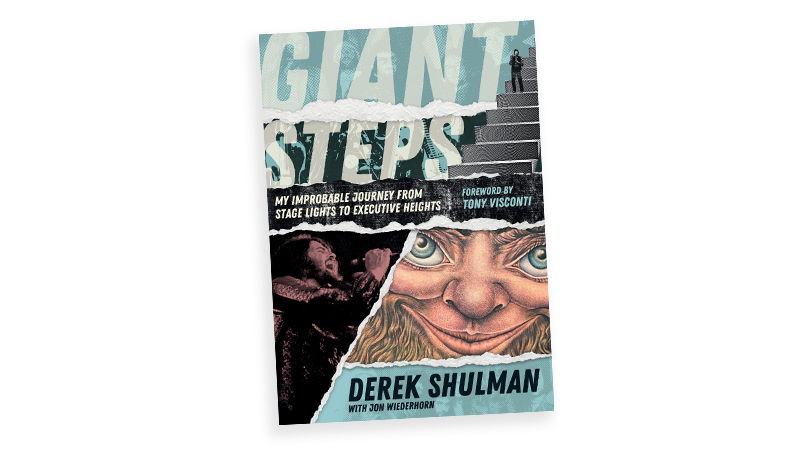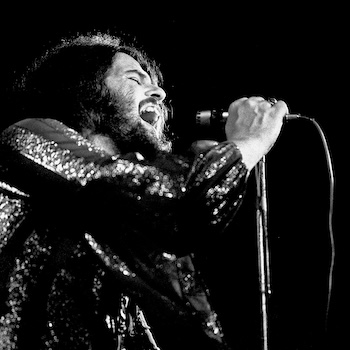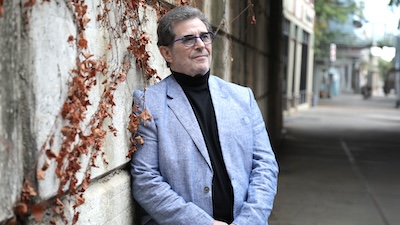“Giant Steps” – Why?
Musician Derek Shulman on his new book

“I’ve always valued authenticity and honesty,” writes Derek Shulman, musician and member of Gentle Giant, record executive, and author of his new book, Giant Steps: My Improbable Journey from Stage Lights to Executive Heights. “It has aways been about the music.” He offers a bird’s eye view of his career and many of the famed musicians he has worked with, from Elton John to Nickelback.
To be honest, I had never considered writing my memoirs until I was cajoled by a good friend of my wife and myself, Jack Schwartz, who at one time was the book editor of the New York Times. At dinner, I’d share stories about musicians like Elton John, Bon Jovi or AC/DC, and he’d always suggest I write a book. He would ask “Have you started’? until eventually around the beginning of 2019 I started to write down some of the stories in “Giant Steps.” However, I really was unable to get into the flow of putting some time aside to write without taking a call or overseeing a remix of Gentle Giant music.
In March 2020, Covid 19 shut everything down. In April 2020, I was one of the first persons in NYC to contract Covid. Luckily, it didn’t reach my lungs, but I felt quite unwell for a week or two. Obviously, I was in isolation in my bedroom feeling sorry for myself with just a television and a laptop to keep me company. I’d facetime my wife who was in the living room, just for company.
It was during these six weeks of isolation and testing until I was Covid free that I re-started writing “Giant Steps.” These were gloomy times for everyone. My daughter-in-law’s father had contracted Covid at the same time as I did and, unfortunately, succumbed to it. I realized that I had dodged a bullet. It conjured up memories of my darkest days as young teenager when my father, a vibrant jazz musician, died in my arms at age 50 years old.
I knew I had to start the book with this story, because this trauma affected my psyche and decisions about my general health for the rest of my life. It also impacted my siblings in various ways, with all of us hoping we’d see our 50th birthdays and beyond.
My father was an incredible musician. He was a jazz trumpeter and bandleader. Music and musicians were always around our house. He was able to pick up any wind instrument and master it within 10 minutes. He was also a heavy smoker and drinker and really lived the lifestyle of a jazz musician, while at the same time being a loving and caring father. The legacy he left lived on in my siblings’ and my DNA. My mother supported our musical ambitions but always made education our top priority.
The fact that my father died at such a young age because of his unhealthy lifestyle made me and my siblings realize what damage it can cause. I’ve never used mind-altering drugs or smoked and rarely drink alcohol. This was very unusual in a business that reveled in all these substances.
Early days
I started my first group while in grammar school in Portsmouth, England, with my school friends and my brother Ray in mid-1965. By 1966, my older brother Phil joined us and we became Simon Dupree & The Big Sound. We performed continuously across the UK and Europe, growing a substantial fan base. We were signed to the Beatles’ label Parlophone Records and recorded at Abbey Road, meeting our heroes in the studio several times.
 In June 1967 we had a top 5 hit called “Kites.” We had several other minor hits, but as the decade drew to a close, we wanted to stretch our musicality and to experiment with other players and new ideas. One former interim member of the group, Reg Dwight, encouraged the Shulman brothers to listen to new sounds from the West Coast like Frank Zappa and Spirit. When we decided it was time to move forward and try something new, we told Reg that we were now looking for new players to form a new group. He was eager to join, so my brother Ray and I visited his house in Watford, London, to hear his music. He played us various songs, but they didn’t really fit what we were looking for. He also announced he was changing his name from Reg Dwight to Elton John. Luckily for him, we turned him down.
In June 1967 we had a top 5 hit called “Kites.” We had several other minor hits, but as the decade drew to a close, we wanted to stretch our musicality and to experiment with other players and new ideas. One former interim member of the group, Reg Dwight, encouraged the Shulman brothers to listen to new sounds from the West Coast like Frank Zappa and Spirit. When we decided it was time to move forward and try something new, we told Reg that we were now looking for new players to form a new group. He was eager to join, so my brother Ray and I visited his house in Watford, London, to hear his music. He played us various songs, but they didn’t really fit what we were looking for. He also announced he was changing his name from Reg Dwight to Elton John. Luckily for him, we turned him down.
In 1970 we found the right players who had the same vision as the Shulman brothers and we became Gentle Giant. In the 10 years we were together, we recorded 12 albums and toured extensively in Europe and North America. Initially we supported bands like Black Sabbath, Jethro Tull etc. Then in the mid to late 1970s, we became headliners in many countries. There are many stories in “Giant Steps” that detail some of the crazy situations we faced as musicians, but thankfully I came out comparatively unscathed.
Changing chords
In 1982, I received a call from a friend in NYC who asked me if was I interested in becoming a record executive. My initial reply was “Of course not.” However, he persisted and said that I should meet the head of a new department at Polygram Records. I decided that I should at least see where this would lead. This meeting started the re-invention of Derek Shulman as the musician to Derek Shulman as the record executive for the next 30 years.
I found my calling in the A&R department at Polygram. The first artist I discovered and mentored was Bon Jovi. From there on, it was a wild ride. I signed Cinderella, Kingdom Come, Men Without Hats and took care of bands like Tears for Fears and Dexy’s Midnight Runners.
In 1988, as senior vice president of A&R, my contract was coming due. Polygram offered me my own label, but thankfully my choices were many. The stories in the book of my being “wooed” are hilarious. I eventually decided to become president and CEO of ATCO Records. I had to hire a new full staff and sign new artists as well as nurturing the artists already signed to the label. It was a fantastic ride for over six years. I signed artists like Pantera, Dream Theater, The Rembrandts, Enufff Z’Nuff and re-established AC/DC and Bad Company to multi-platinum status.
Reinvention – again
Then the realization of me being in the business of music as opposed to the music business really hit home to me. Politics and backstabbing occurred at the highest level. During this time, I found that my reflection in the mirror was unfamiliar to me. The schoolboy who wanted to be a rock star had almost vanished. All I could see was this person in a suit who I didn’t recognize. It was time to stop this adventure.
 I took a couple of months off to become myself again. Then I had a call from an independent record label. The owner wanted me to build the company from a small heavy metal label to become an important rock label. I became president and CEO of Roadrunner Records. It was an incredible and refreshing change of pace. I met with all the staff and realized that this company had a brand that the owner was unaware of. In the five years I ran the company, we had the label’s first gold record. Then the company exploded with the signing of Slipknot, which went multi-platinum. The biggest feather in my cap was to follow with the signing of Nickelback, which made Roadrunner Records the biggest independent record label of the 21st century.
I took a couple of months off to become myself again. Then I had a call from an independent record label. The owner wanted me to build the company from a small heavy metal label to become an important rock label. I became president and CEO of Roadrunner Records. It was an incredible and refreshing change of pace. I met with all the staff and realized that this company had a brand that the owner was unaware of. In the five years I ran the company, we had the label’s first gold record. Then the company exploded with the signing of Slipknot, which went multi-platinum. The biggest feather in my cap was to follow with the signing of Nickelback, which made Roadrunner Records the biggest independent record label of the 21st century.
I look back in “Giant Steps” and realize that I’ve been so lucky to have been involved with so many amazing musicians and artists. I’ve always valued authenticity and honesty. It has never been about the money and fame for me. It has aways been about the music. This is what “Giant Steps” is all about.
Learn more about Derek Shulman and his book at:
Giant Steps: My Improbable Journey from Stage Lights to Executive Heights by Derek Shulman
Release date Dec. 2, 2025
Other Boomer books you might enjoy
Later Days author Chip Jacobs on “The Lost Art of Album Release Parties”
My Name Is Barbra


